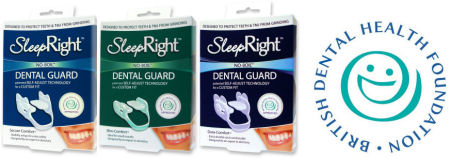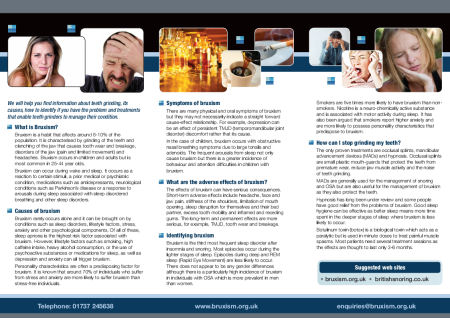There is a wide range of intervention or treatment methods that have been proposed over the years to decrease the level of bruxism.
Physical rehabilitation techniques have been thought to assist in correcting bruxism. The objective of developing or strengthening the jaw opening muscles is to 'hold the mandible in balance'. In one study a special facial exerciser was used to train the mandible muscles. The level of evidence on this and other similar techniques is extremely low and researchers have failed to provide plausible evidence of their efficacy.
The use of medication in the management of bruxism has been studied but has relied solely on patients' reports. Drugs such as muscle relaxants have a temporary effect on jaw muscle activity, although the maintenance of their therapeutic efficacy, their long term tolerability and risk of addiction need further investigation. In fact, in one study, two thirds of the patients dropped out due to intolerable side effects. For most antidepressant drugs are not generally effective in reducing bruxism. Although one study found a small number of participants who clearly responded to the treatment. Other drugs such as sedative and anxiolytic drugs (drugs to treat anxiety) seem promising although the safety of their use is still in question as severe morning hypotension (low blood pressure) has been noted in 20% of patients. Botulinum toxin (BTX) is a biological toxin which acts as a paralytic. Though it is highly toxic, it is used in minute doses both to treat painful muscle spasms, and as a cosmetic treatment. It is administered by intramuscular injection and the paralytic effects is thought to last 3-6 months. However, it was found from one study that patients needed several treatment sessions and even then the researchers were unclear as to whether the 'response' was favourable. Most of the cited pharmacological studies indicate that different classes of drugs may influence muscle activity related to bruxism but safety issues need further assessment before clinical recommendations can be made.
Psychoanalysis, autosuggestion, hypnosis, progressive relaxation, meditation, selfmonitoring, sleep hygiene and habit reversal/habit retaining have been prescribed for the management of bruxism. Giving an autosuggestion before falling asleep such as 'I will wake up if I grind my teeth' is reported by psychoanalysts to help the bruxist become aware of the habit, even while asleep. Unfortunately, autosuggestion lacks scientific strength and is not recommended.
Hypnosis has long been under review and some bruxists have found profound relief from problems related to sleep bruxism. One study reviewed the long-terms effects of hypnosis and a positive outcome was still applicable even after 36 months. This treatment has promise, and for some it may be successful.
More general relaxation techniques including meditation are supposed to produce a sense of self-esteem and control over one's body. However, there is no current literature regarding the efficacy of this holistic approach to the management of bruxism.
Avoiding stimulants (tea, coffee, cigarettes) for several hours before bed and maintaining a regular sleep schedule promotes better sleep. Better sleep means that more time is spent in the deeper sleep stages and less arousals occur. Bruxism occurs mainly in the lighter sleep stages. No studies into sleep hygiene as a successful treatment for sleep bruxism have been published.
Biofeedback works on the premise that bruxers can 'unlearn' their behaviour when a stimulus makes them aware of their jaw muscle activity. It is thought that the patient can be trained to control the unwanted jaw muscle activities through auditory and visual feedback. However, these methods may be useful for daytime bruxism but their efficacy is doubtful in patients with sleep bruxism. The potential for continued sleep disruption and subsequent daytime sleepiness is high and therefore this technique is not considered a safe treatment.
MADs are generally used for the management of snoring and sleep apnoea but researchers have investigated their use for the management of sleep bruxism. Many studies report highly effective outcomes in the reduction of sleep bruxism but with undesirable side effects. One study compared the effectiveness between a MAD and occlusal splint. A moderate reduction in sleep bruxism was found with the occlusal splint but a large reduction in bruxism activity with the MAD. This result was difficult to explain but it was hypothesized that because two thirds of the study sample reported pain when using the MAD it may be that with the presence of pain, bruxism activity was reduced.
There are two categories of occlusal management strategies: 'true' occlusal interventions and occlusal appliances.
Occlusal interventions usually involve occlusal equilibrium, rehabilitation and dental treatment. The treatment is aimed at achieving a 'harmonious' relationship between occluding surfaces. However, there is no high quality evidence to support the use of these irreversible techniques and therefore they are not generally recommended in the first instance.
The most common and effective treatment involves protecting the teeth with occlusal splints. These splints have different names (occlusal bite guard, bruxism appliance, bite plate, night guard), vary in appearances and properties, but in essence, they are all designed to prevent inadvertent tooth movement.
The occlusal splint is the treatment of choice as it reduces grinding noise and protects the teeth from premature wear without substantial adverse effects. Occlusal splints reduce muscle activity associated with sleep bruxism but it must be acknowledged that these devices, like MADs for snoring and sleep apnoea, are only a control and will not cure the condition.
Would you like to receive our most current information and offers by e-mail? Enter your e-mail address here to sign up.

The SleepRight dental guards are the only occlusal splints approved by the British Dental Health Foundation. Find out more.

If you would like us to provide your surgery with our information leaflets, please complete the on-line request form.
Do you need more information for your article or you want to organise an interview? Contact our media desk.

Introducing the world's leading oral appliance for bruxism, snoring and sleep apnoea. Read more.